Roger Federer and Rafael Nadal are the most revered names in tennis. Be it Federer’s ballerina-like movement on court or Nadal’s of-the-cuff ferocious forehand, both have enthralled the world with their tennis prowess.
Both players have entertained us with their unorthodox shot-making for years, and have played in an era where records have been constantly tumbling. The quality of their top-notch tennis regularly sends shivers down our spines, and they have amassed a whopping 37 Grand Slams together.
Over the past decade, it would almost always be either Novak Djokovic or Andy Murray who would halt their path to glory. However, there have been a few instances when other players have also stopped the two legends.
In this article, we take a look at five players other than Murray and Djokovic to have beaten both Federer and Nadal in their Grand Slam career.
#5 Jo-Wilfried Tsonga
Australian Open 2008 Semifinal – def. Rafael Nadal 6-2, 6-3, 6-2
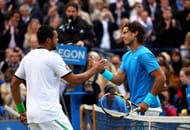
Having turned pro in 2004, Tsonga announced himself to the tennis world in 2008. He was out of action for most part of 2005 and 2006 owing to multiple injuries.
Known for his powerful serve and strong forehand, Tsonga defeat four seeded players en-route to the 2008 Australian Open final, which included Andy Murray, Richard Gasquet, Mikhail Youzhny and Rafael Nadal. It was the victory over Nadal that encapsulated his most riotous display of tennis.
In the semi-final fixture against Nadal, Tsonga came out all guns blazing and ended up dropping just seven games. However, he couldn't prevail in his maiden and so far only Grand Slam final, which he lost in four sets to Djokovic.
Wimbledon 2011 Quarterfinal – def. Roger Federer 3-6, 6-7, 6-4, 6-4, 6-4
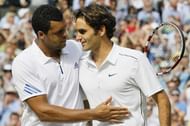
This was Tsonga’s second Grand Slam encounter with Federer. The Swiss was the clear favorite on grass at Wimbledon, and went ahead after breaking Tsonga in the second game of the first set. In the second set, both players held their serve comfortably to take the game into a tie-breaker which Federer won 7-6 (7-3).
But in the following sets, it was all about perfect shots on critical points, which Tsonga rather than Federer executed immaculately. At 1-1 in the third set, Tsonga converted a rare break point with a down-the-line winner, and he hung on to wrap it up 6-4.
The same plot repeated in the fourth and fifth sets, as he broke Federer early in each to complete a sensational comeback to eliminate Federer from his favorite tournament.
Shop Online Tennis Shoes at the Best Prices
Bonus Mention
French Open 2013 Quarterfinal – def. Roger Federer 7-5, 6-3, 6-3
#4 Stan Wawrinka
Australian Open 2014 Final – def. Rafael Nadal 6-3, 6-2, 3-6, 6-3
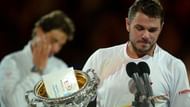
Stan Wawrinka's first major achievement in tennis was the doubles Olympic gold he won with Roger Federer at Beijing 2008. He broke into the top 10 rankings in 2008, and was also the flag bearer for Switzerland at the 2012 London Olympics.
2014 was a breakthrough season for Wawrinka. He defeated Djokovic in a five set thriller in the quarterfinal of the Australian Open and went on to reach the final, where he was up against World No. 1 Rafael Nadal.
Nadal was the clear favorite to the final but Wawrinka had other ideas.
He produced unbelievable tennis to win the first set 6-3, which at first looked like a temporary setback for Nadal. But the Spaniard's situation grew worse as he suffered a back injury in the second set which made him less mobile on the court; he ended up losing the second set 6-2.
Nadal did stage a comeback by winning the third set 6-4, but his injury wasn’t letting him play his natural game. He was broken mid-way through the fourth set and Wawrinka served for the match and won his maiden Grand Slam, reaching a career high World No. 3 ranking in the process.
French Open 2015 Quarterfinal - def. Roger Federer 6-4, 6-3, 7-6 (7-4)
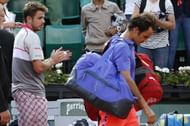
The 2015 French Open was all about Stan Wawrinka, where he again defeated two of the biggest names (Federer and Djokovic) in tennis. In his quarterfinal match, he absolutely bullied Federer with his powerful groundstrokes, breaking him in the very first game of the first set.
In the second set, he broke Federer twice with his monstrous stroke-play. Although Federer managed to take the third set into a tie-breaker, he was merely delaying the inevitable as Wawrinka went on to win it 7-4.
Wawrinka was flawless throughout the 2015 French Open, and went on to defeat Djokovic in four sets to lift his second Grand Slam trophy.
#3 Juan Martin Del Potro
US Open 2009 Semifinal - def. Rafael Nadal 6-2, 6-2, 6-2
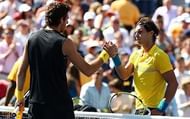
In 2009, Juan Martin del Potro rose to prominence by reaching the French Open semi-final where he lost to Federer in a five-setter. But at the US Open that same year, he did something truly incredible: he become the first player to beat both Nadal and Federer in the same Grand Slam.
In the semi-final, Nadal had no answer to Del Potro’s stroke play which produced some outstanding winners and also drew errors from the Spaniard. As a result, Nadal suffered his biggest margin of defeat in a Grand Slam match.
US Open 2009 Final - def. Roger Federer 3–6, 7–6(7–5), 4–6, 7–6(7–4), 6–2
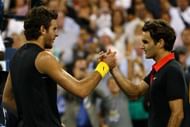
Del Potro had not forgotten the defeat at the hands of Federer in the 2009 French Open, and was looking for redemption.
Federer started the match on the offensive by breaking Del Potro early on and won the first set 6-3. He was serving for the second set at 5-4 but Del Porto broke back and took the set to a tie-breaker, ultimately winning it 7-5.
Federer won the third set after breaking Del Potro’s serve at 5-4, and had multiple break point opportunities in the fourth set but couldn’t convert them. The set went to a tie-breaker again which Del Potro won after Federer committed a few unforced errors, including an untimely double fault.
In the fifth set, Federer looked a bit fatigued and was broken in his opening service game. His stroke play became iffy after that, and he couldn’t mount a comeback as Del Potro went on to win the fifth set 6-2.
Bonus Mentions
US Open 2017 Quarterfinal – def. Roger Federer 7-5, 3-6, 7-6(10-8), 6-4
US Open 2018 Semifinal – Nadal retired 7-6 (7-3), 6-2
#2 Tomas Berdych
Australian Open 2015 Quarterfinal – def. Rafael Nadal 6-2, 6-0, 7-6(7-5)
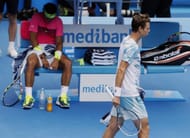
Tomas Berdych's previous win against Nadal before this match was back in 2006. After that, Nadal won 17 consecutive matches against the Czech.
Everyone expected the same to continue in Melbourne. However, Berdych had other ideas.
He broke the Spaniard twice in the opening set and went on to win it 6-2. The second set was a masterclass from Berdych, as he became only the third player in history - after Gaston Gaudio and Federer - to bagel Nadal at a Slam.
The third set was a tight affair that went into a tie-breaker which saw Berdych race to a 5-1 lead. But Nadal fought back to make it 5-4, before a poor serve resulted in Berdych slamming a powerful return for a 6-4 lead.
At 6-5, Nadal returned a powerful serve into the net and that was game, set and match Berdych.
Wimbledon 2010 Quarterfinal – def. Roger Federer 6-4, 3-6, 6-1, 6-4
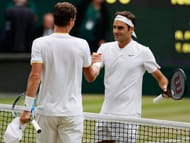
Their rivalry dates back to 2004, when Berdych beat Federer in round of 32 at the Athens Olympics. After that, Federer won all the encounters until 2009, but in 2010 all that was going to change.
Their last Grand Slam match before this was at the 2009 Australian Open fourth round which Federer won after coming back from two sets down.
In this match, Federer struggled from the opening game, where he was taken to a couple of deuces before finally holding serve. Berdych's real ammunition was the accuracy and power he generated from his forehand, which caused plenty of problems to Federer.
The Swiss felt the full wrath of Berdych's ammunition at 3-3 when he couldn't track down a terrific forehand passing shot. He subsequently faced another break point which Berdych converted after his powerful shot forced an error from Federer.
Federer was back in business in the second set when got an early break and held his remaining service games to win it 6-3. But in the third, Federer's serving speed slowed down a notch, and this allowed Berdych to take the ascendancy. He broke Federer in the second game with a scrumptious forehand winner and subsequently drew an error.
Berdych's precision in his shot making just kept getting better and he broke Federer again and won the third set 6-1.
In the fourth set, Berdych produced some sublime tennis under pressure. Federer had two break points leading 3-2 in the fourth set, but the Czech saved the first break point with an audacious inside-out forehand winner and then engineered a risky but marvelous drop shot to save the second.
Berdych was oozing confidence at that stage and in the following game, after multiple deuces, he got a break point. His powerful forehand drew an error from Federer, and he subsequently served for the match at 5-4. After negotiating a few deuces, he finally conquered Federer on his own turf.
#1 Robin Söderling
French Open 2009 Quarterfinal – def. Rafael Nadal 6-2, 6-7 (7-2), 6-4, 7-6 (7-2)
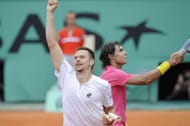
This was the third Grand Slam encounter between the two. In the previous clash at Wimbledon 2007, Söderling lost a hard fought five-setter which lasted for four days owing to rain delays.
This match looked like a foregone conclusion; everyone assumed Nadal would tame his opponent in straight sets. But it turned out to be something entirely different for the Spaniard.
Söderling broke Nadal twice with his potent groundstrokes to win the opening set 6-2. The second set went to a tie-breaker in which Nadal took an unassailable 6-0 lead; he won it on his third set point after Söderling sent his forehand long.
The Swede broke Nadal's serve again mid-way through the third set and held his remaining service games to win it 6-4.
The fourth set went to a tie-breaker after both players exchanged breaks early on. Soderling dominated Nadal in the breaker and raced to a 6-1 lead. At 6-2, Nadal tried a drop shot which landed wide, and it was utter jubilation for Söderling - who became the first player ever to beat Nadal at the French Open.
French Open 2010 Quarterfinal – def. Roger Federer 3-6, 6-3, 7-5, 6-4
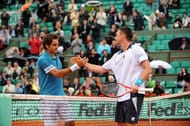
A year after Federer scripted his maiden French Open triumph in 2009, he was up against the same but a more rejuvenated opponent. Federer won the previous encounter against Söderling in straight sets at Wimbledon 2009.
In the opening set, Federer took control by staying on the baseline and executing a few wonderful drop shots. It was in the eighth game, at 4-3, when Federer's delightful drop shot drew an error from Söderling to bring up a break point. Federer converted it as a Söderling volley sailed wide, and served out the set.
In the second set, both players primarily operated from the baseline, but Söderling started to attack Federer by venturing to the net. This strategy helped him save a critical break point in the opening game of the set. In the following game, Söderling's return of serve and forehand started to do some serious damage as he broke Federer and then went on to serve it out 6-3.
In the third set, the turning point came when Federer had a set point at 5-4 on Söderling's serve. It was a dramatic point, as Söderling ran towards the net and went for a smash volley; it appeared that he had saved the set point, but Federer cheekily sprinted behind the baseline to bring the ball back in play. But it was a fruitless attempt, as Söderling had the empty court to place the ball anywhere he liked, which he did.
At 5-5, there was a slight rain delay, which ended up breaking Federer's rhythm. He double-faulted to give a break point to Söderling, who happy obliged by whacking a forehand winner to get the break. He successfully served out the set and won it 7-5.
In the fourth set, Federer broke Söderling to take a 2-0 lead, but was immediately broken back. The match then had another momentary rain delay. Once play resumed, Federer started to commit unforced errors which allowed Söderling to get a vital break.
The Swede served for the match and held, to book his place in the semi-final of 2010 French Open final.
Honorable Mention
Marin Cilic
Australian Open 2018 Quarterfinal – Nadal retired 3-6, 6-3, 6-7 (7-5), 6-2, 2-0
US Open 2014 Quarterfinal – def. Roger Federer 6-3, 6-4, 6-4
The reason Marin Cilic wasn't included in the list is that although he officially won the match, he did not completely stop Nadal. It was Nadal's injury that forced him to retire from the match.
